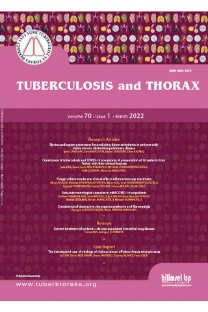COVID-19 pandemisi ve uyku bozuklukları: COVID-somnia
COVID-19 pandemic and sleep disorders: COVID-somnia
___
- 1. Gupta R, Pandi-Perumal SR. COVID-Somnia: How the Pandemic Affects Sleep/Wake Regulation and How to Deal with it? Sleep Vigil 2020; 4: 51-3.
- 2. Otsuka Y, Kaneita Y, Itani O, Nakagome S, Jike M, Ohida T. Relationship between stress coping and sleep disorders among the general Japanese population: A nationwide representative survey. Sleep Med 2017; 37: 38-45.
- 3. Chattu VK, Manzar D, Soosanna Kumary S, Burman D, Spence DW, Pandi-Perumal SR. The Global Problem of Insufficient Sleep and Its Serious Public Health Implications. Healthcare 2019; 7(1): 1-16.
- 4. Seng EK, Cervoni C, Lawson JL, Oken T, Sheldon S, McKee MD. The Burden of Sleep Problems: A Pilot Observational Study in an Ethnically Diverse Urban Primary Care Setting. J Prim Care Community Health 2016; 7(4): 276-80.
- 5. Rajkumar RP. COVID-19 and mental health: A review of the existing literature. Asian J Psychiatr 2020; 52: 102066.
- 6. Brooks SK, Webster RK, Smith LE, Woodland L, Wessely S, Greenberg N, et al. The psychological impact of quarantine and how to reduce it: rapid review of the evidence. Lancet 2020; 395: 912-20.
- 7. DiGiovanni C, Conley J, Chiu D, Zaborski J. Factors influencing compliance with quarantine in Toronto during the 2003 SARS outbreak. Biosecur Bioterror 2004; 2(4): 265- 72.
- 8. Hawryluck L, Gold WL, Robinson S, Pogorski S, Galea S, Styra R. SARS control and psychological effects of quarantine, Toronto, Canada. Emerg Infect Dis 2004; 10(7): 1206-12.
- 9. Salari N, Hosseinian-Far A, Jalali R, Vaisi-Raygani A, Rasoulpoor S,Mohammad M, et al. Prevalence of stress, anxiety, depression among the general population during the COVID-19 pandemic: a systematic review and meta-analysis. Global Health 2020; 16(1): 57.
- 10. Killgore WDS, Cloonan SA, Taylor EC, Fernandez F, Grandner MA, Dailey NS. Suicidal ideation during the COVID-19 pandemic: the role of insomnia. Psychiatry Res 2020; 290: 113134.
- 11. Ibarra-Coronado EG, Pantaleón-Martínez AM, Velazquéz- Moctezuma J, Prospéro-García O, Méndez-Díaz M, Pérez- Tapia M, et al. The Bidirectional Relationship between Sleep and Immunity against Infections. J Immunol Res 2015; 2015: 678164.
- 12. Banerjee D, Viswanath B. Neuropsychiatric manifestations of COVID-19 and possible pathogenic mechanisms: insights from other coronaviruses. Asian J Psychiatry 2020; 54: 102350.
- 13. Cardinali DP, Brown GM, Reiter RJ, Pandi-Perumal SR. Elderly as a high-risk group during COVID-19 pandemic: effect of circadian misalignment, sleep dysregulation and melatonin administration. Sleep Vigil 2020; 26(1): 1-7.
- 14. Tasnim S, Rahman M, Pawar P, Chi X, Yu Q, Zou L, et al. Epidemiology of sleep disorders during COVID-19 pandemic: A systematic scoping review. medRxiv 2020.05.17.20104794; doi:10.1101/2020.05.17.20104794
- 15. Carbonell LP, Meurling JI, Wassermann D, Gnon Vi, Leschzine G, Weighall A, et al. Impact of the novel coronavirus (COVID-19) pandemic on sleep. J Thorac Dis 2020; 12(2): S163-S175.
- 16. Jahrami H, BaHammam AS, Bragazzi NL, Saif Z, Faris MA, Vitiello MV. Sleep problems during the COVID-19 pandemic by population: a systematic review and meta-analysis. J Clin Sleep Med 2021; 17(2): 1-15.
- 17. Ferrando M, Bagnasco D, Roustan V, Canonica GW, Braido F, Baiardini I. Sleep complaints and sleep breathing disorders in upper and lower obstructive lung diseases. J Thorac Dis 2016; 8(8): E716-E725.
- 18. Shi L, Lu ZA, Que JY, Huang XL, Liu L, Ran MS, et al. Prevalence of and risk factors associated with mental health symptoms among the general population in China during the coronavirus disease 2019 pandemic. JAMA Netw Open 2020; 3(7): e2014053.
- 19. Alnofaiey YH, Alshehri HA, Alosaimi MM, Alswat SH, Alswat RH, Alhulayfi RF, et al. Sleep disturbances among physicians during COVID‑19 pandemic. BMC Res Notes 2020; 13: 493.
- 20. Söderström M, Jeding K, Ekstedt M, Perski A, Akerstedt T. Insufficient sleep predicts clinical burnout. J Occup Health Psychol 2012; 17(2): 175-83.
- 21. Urooj U, Ansari A, Siraj A, Khan S, Tariq H. Expectations, fears and perceptions of doctors during Covid-19 pandemic. Pak J Med Sci 2020; 36: S37-42.
- 22. Fletcher KE, Underwood W, Davis SQ, Mangrulkar RS, McMahon LF Jr, Saint S, et al. Effects of work hour reduction on residents’ lives: a systematic review. JAMA 2005; 294: 1088-100.
- 23. Smith JW, Denny WF, Witzke DB. Emotional impairment in internal medicine house staff. Results of a national survey. JAMA 1986; 255(9): 1155-8.
- 24. Medic G, Wille M, Hemels ME. Short- and long-term health consequences of sleep disruption. Nat Sci Sleep 2017; 9: 151-61.
- ISSN: 0494-1373
- Yayın Aralığı: Yılda 4 Sayı
- Başlangıç: 1951
- Yayıncı: Tuba Yıldırım
Fuat EREL, Candan GÜNGÖR, Nurhan SARIOĞLU, Gülden Deniz AKSU, Gulay TURAN, Gülen DEMİRPOLAT
Hipereozinofili: Tanısal zorluklar
İnsu YILMAZ, Mehmet KÖSE, Gülden PAÇACI ÇETİN, Bahar ARSLAN
Fatma YILDIRIM, Pınar Yıldız GÜLHAN, Meltem ŞİMŞEK
Serir ÖZKAN, Onur Fevzi ERER, Celalettin YILMAZ
Pharyngo-esophago-gastric dysmotility in intubated patients: A comprehensive review
Oğuz KARCIOĞLU, Sevinc SARİNC ULASLİ, Elif BABAOGLU, Emine KELEŞ, Ümran Özden SERTÇELİK, Sevgen ÖNDER, DENİZ KÖKSAL
SARS-CoV-2 associated Guillain-Barre syndrome after awaking on the ICU: consider differentials
Ayça KOCA TANRIVERDİ, Leyla TALAN, Turgut ŞAHİN, GÜLE ÇINAR, Ebru EVREN, ZEYNEP CEREN KARAHAN, Müge GÜNALP ENEYLİ, NERİMAN DEFNE ALTINTAŞ, Özden ŞENER
Biyolojik ajan kullanan ağır astımlı hastalarda COVID-19
Kurtuluş AKSU, Hale ATEŞ, İlkay KOCA KALKAN, Musa TOPEL, Ali ÖNCÜL, Dilek ÇUHADAR ERÇELEBİ, Süleyman TÜRKYILMAZ, Şenay DEMİR, Selma YEŞİLKAYA
Göğüs hastalıklarında yapay zeka uygulamaları ve pandemi döneminde sağladığı avantajlar
